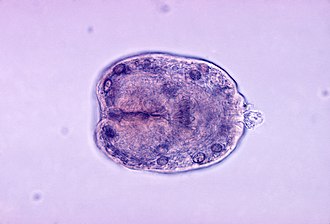Image of Echinoccoccus granuolosus - ripe for humans' ingestion - if they put their mouths too close to their doggies' snouts!
While in Barbados
in May I had occasion to talk to Derek, a veterinarian and husband of my wife’s
niece. I inquired as to whether there were any more outbreaks of tapeworm –
especially in canines. We both knew that one of the ways humans can become
infected is by getting up too close and personal with Fido – especially his snout – which can plumb some rather
unpleasant places. (When we had our own Rottweilers living in Bim, we’d often
find one or the other eating their own feces – despite being fed plenty of
food.)
But he referred me to Echinoccoccus granuolosus, a dog
tapeworm infection more common in places like Eastern
Europe . In one particular case – discussed in an article in
Discovery (‘Unknowing Host’, p. 36, October, 2013) the human victim evidently
had accidentally swallowed a tiny ovum passed in the dog’s stool. This then had the misfortune (for him) in
developing into a massive liver cyst.
Derek pulled the magazine from his science library and
referenced the part that truly amazed me where the author and physician (Claire
Panosian Dunavan) reported the result of her CT scan on the patient (a Mr.
Kazaryan) and noted:
“two huge sacs (called hydatid cysts) that occupied two-thirds of his
liver. Kazaryan harbored hundreds, if not thousands, of budding tapeworm larvae”.
She added that in 30 years as an infectious diseases
specialist she’d never seen “such a huge cache of parasites”.
Derek pointed this out matter –of-factly and added:
“Just imagine two bags full of tapeworm larvae all roiling
around inside just waiting for the bag to burst so they can be released.”
Uh, yeppers – and I can just see that scene from the
‘Alien’ flick too, where John Hurt’s character has barely consumed two bites of
a meal on the Nostromo before his
belly blows open and the alien pops out.
To emphasize the point, the doc then referred to the guy’s
x-rays and:
“two watery gray and white silhouettes in his liver – the largest as big
as an eggplant- and its nearby satellite the size of a bell pepper”.
She went on to say that the “immediate threat to the patient
was a forceful blow to the belly” which would instantly cause the cysts
to rupture and the little beggars to escape.
Worse: “Rapid leakage of parasite proteins into the human
blood stream can trigger dramatic allergy, even death”.
The solution? Surgery had to be performed – by the author’s
colleague – Dr. Ron Busuttil, a surgeon at UCLA. According to Dunavan:
“Busuttil didn’t blanch at Kazaryan’s advanced age or his enormous cysts”
But on the other hand he always had in mind a complication:
even a spatter of cyst contents could plant many more. The trickiest part? Detecting the fibrous
plane separating the cyst wall from healthy liver.
Derek, also a surgeon, said he could just imagine the
instant Busuttil located it – a true “Eureka ”
moment.
In the end, the operation went as planned and Busuttil
vacuumed out 2.5 liters of larvae laced fluid from the huge carbuncle. That is
just over three-fifths of a gallon for those who want the English measure.
According to the account he then had to irrigate the cyst
cavity with saline solution (to kill any embryonic larvae stuck in there), trim
the tissue from the inner “brood” lining of the cyst. As Dererk put it: ‘think
of the soft inside tissue of a watermelon – not the fleshy red pulp- but the outer harder area – all full of brood
worms”. Yeah right, and I am trying to eat this chicken Roti!
Then, the coup-de –grace was administered by using an argon
laser device to vaporize the remaining parasite membrane.
Easy? No problem.
We discussed the article a bit further and I asked Derek
what the real odds were, say that this could happen to an American (or even
Bajan) who likes to snuggle Fido and even give a peck on the snout.
“Probably not much,
maybe 1 in 100. But knowing where dogs put their mouths and noses I
wouldn’t chance it. Besides, who wants to go through all the grief this guy did
to get those big cysts out?”
Good point!

No comments:
Post a Comment